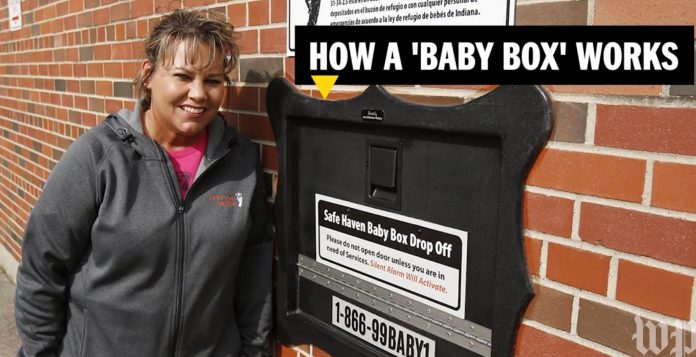
In her mid-30s, Monica Kelsey learned her life began in tragedy. Her mother, at the age of 17, had been attacked, raped and left for dead. In the aftermath of her assault, she decided to have an abortion, still illegal in 1972. But at the underground clinic she had a change of heart, according to Kelsey’s autobiography, and continued with her pregnancy. Later, she would abandon her infant when Kelsey was two hours old.
More than four decades later, Kelsey is now a volunteer firefighter and anti-abortion advocate. She’s among those leading the charge to install climate-controlled baby boxes – places for mothers to anonymously deposit their unwanted children – across Indiana, the first of which were placed at the end of April.
“This is not criminal,” Kelsey recently told the AP. “This is legal. We don’t want to push women away.”
The boxes work a bit like a cross between a library book drop-off and a people-pod you might find in a Japanese capsule hotel. Padded and kept at comfortable temperature, the small box automatically alerts emergency responders within a minute of a baby being deposited. Kelsey told IndyStar that the incubator locks after a baby is placed inside, and any baby left in one will be retrieved within five minutes.
The first receptacle was recently embedded in the brick wall of a fire station in the Indiana town of Woodburn, near the Ohio border. Another box followed in Michigan City. Each box costs between $1,500 and $2,000, according to Kelsey; Indiana’s Knights of Columbus will fund the initial batch of 100.
Baby boxes are legal thanks to so-called safe haven legislation, also known colloquially as Baby Moses laws. In 1999, then-governor of Texas George W. Bush signed the first Baby Moses bill into law, in the wake of 13 dead infants found in Houston trash bins.
All 50 states, as well as Washington, D.C., now have some form of such child abandonment laws. Abandoned infants must be no older than a certain age; Indiana’s law stipulates children under 45 days old may be anonymously dropped off at a firehouse, hospital or police station.
Such boxes are not a uniquely American phenomenon. South Korean pastor Jong-rak Lee, profiled in the 2015 film The Drop Box, constructed a Moses box at his house in the mid-2000s. Of the 660 babies reported to have come through his box, the Lee family has adopted 19.
The boxes seem to invite just as much controversy, however, as they do infants. In Europe, the boxes became a point of contention in 2012, when the UN Committee on the Rights of the Child argued that drop-offs facilitate abandonment.
“Baby boxes do not operate in the best interest of the child or the mother,” UNCRC sociologist Maria Herczog told the Christian Science Monitor. “They encourage women to give birth in unsafe and life-threatening conditions.”
Despite these laws, child abandonment in trash bins and other often-fatal areas has not stopped. Between 1999 and 2006, only 40 women in Texas used the state’s Baby Moses law, the Dallas Morning News reported. During the same 7-year span, 3,000 children had been abandoned.

